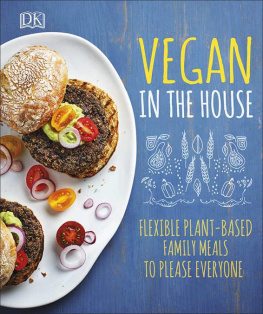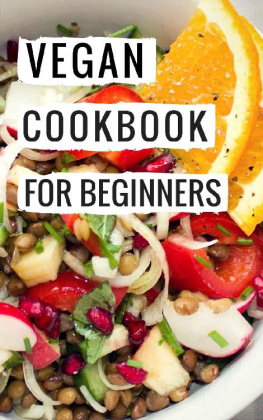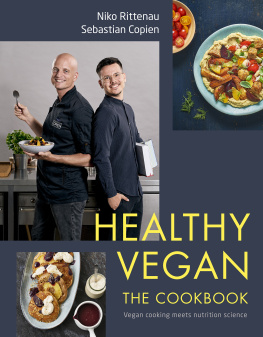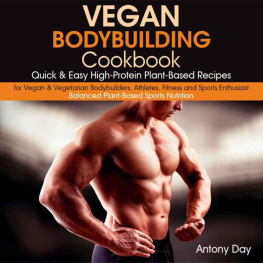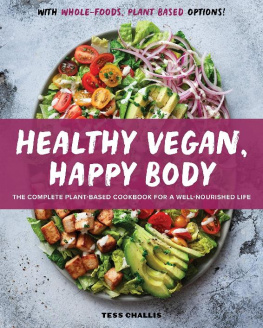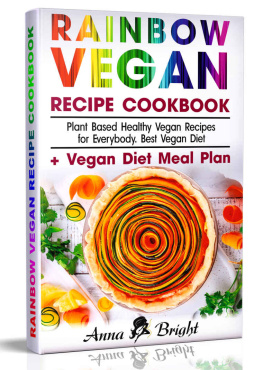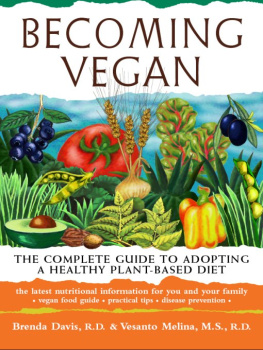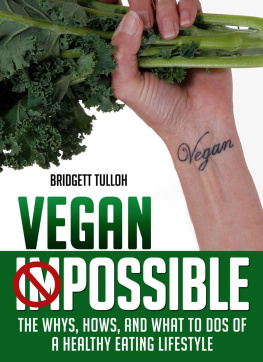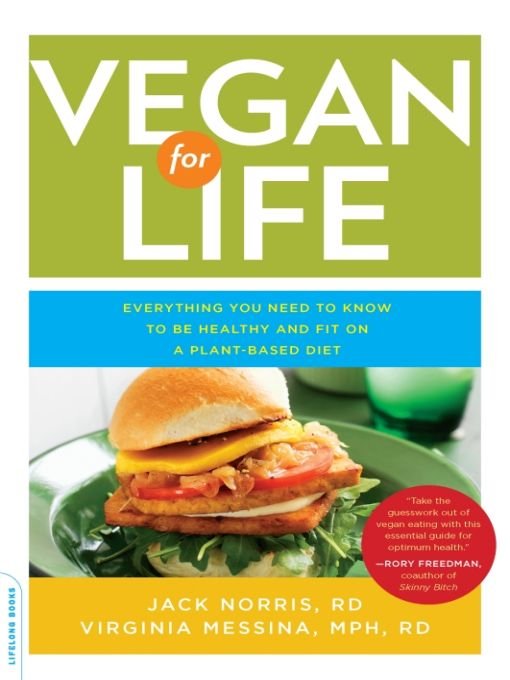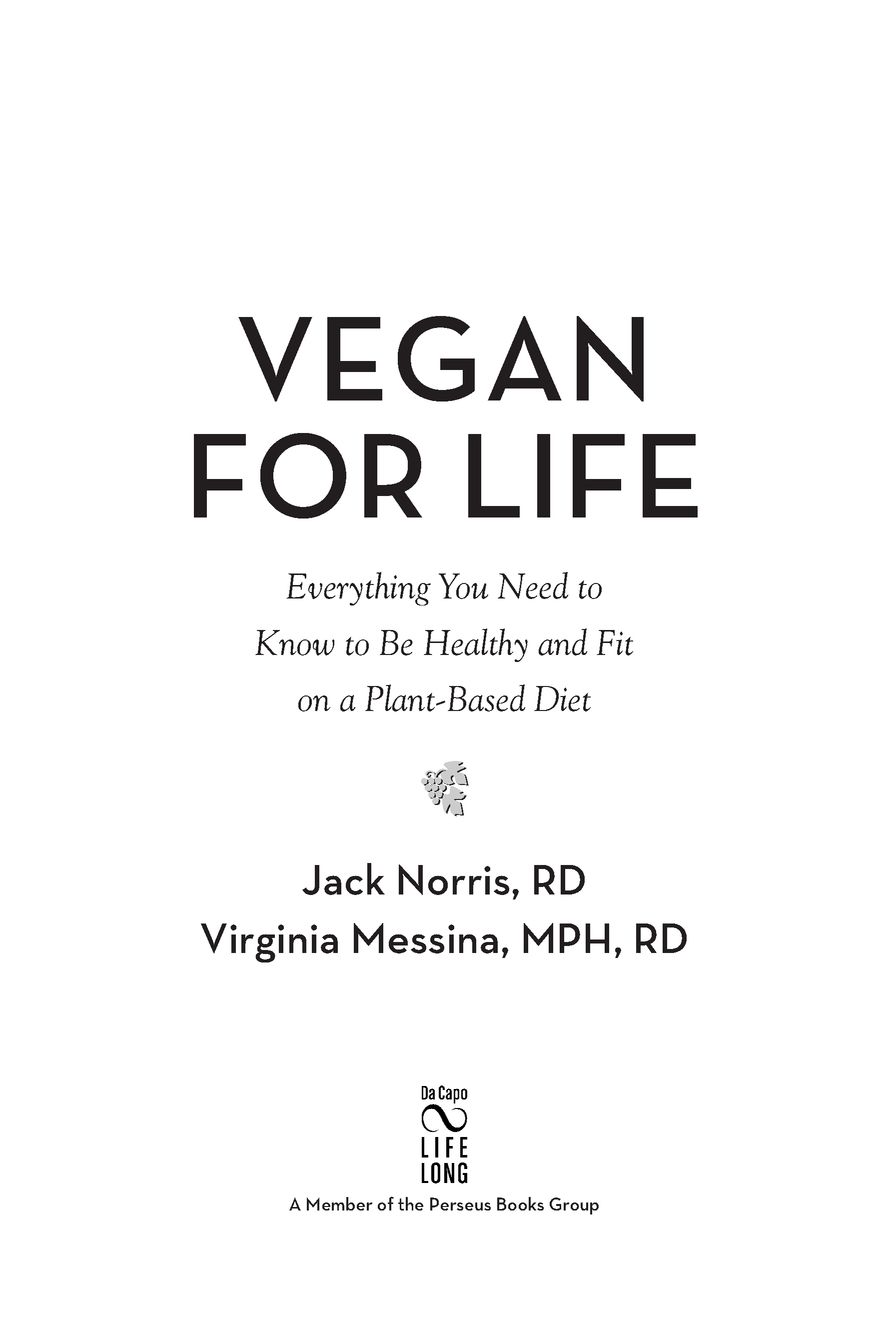Table of Contents
PRAISE FORVEGAN FOR LIFE
The vegan revolution is upon us! Vegan for Life is an essential handbook for understanding all of the ins and outs of this increasingly popular lifestyle choice.
Mark Reinfeld, coauthor of The 30-Minute Vegan, The 30-Minute Vegans Taste of the East, The Idiots Guide to Eating Raw, and Vegan Fusion World Cuisine
In a clear and concise manner, vegan nutritionists Jack and Virginia spell out what it really means to be healthy. Reading this well presented, fact-based book about your well-being and the well-being of our planet, youll be equipped with all the necessary tools to achieve your own personal best in health.
Robert Cheeke, best-selling author of Vegan Bodybuilding & Fitness
Vegan For Life shows not only the adequacy and benefits of a vegan diet, but the steps to make the transition and do it right! Its the book I recommend to all of my clients.
Matt Ruscigno, MPH, RD
To all farmed animals,
and to those who work to end their suffering.
INTRODUCTION
Going Vegan for Life
A vegan diet is the worlds most simple solution to a host of complex problems.
For almost all of human history, people ate whatever they could get their hands on; availability, habit, and taste preferences were the factors that drove food choices. That changed a mere century or so ago, when the new science of nutrition revealed that food was more than just something to eatit was part of an approach to optimal health.
But in the past few decades, weve come to understand that what we eat has more far-reaching effects. Not just on our health but on the lives of the animals who share this planet with us and on the very future of the planet itself. Our current food system supports a growing health crisis in America, a worrisome loss of global resources, and some of the worst cruelty to animals imaginable. Today, there are a lot of good reasons to embrace a vegan diet.
Going vegan is easy and fun. But without a doubt, there is a little bit of a learning curve. Thats why we wrote this bookto provide both newcomers and more seasoned vegans with solid information that will keep your diet healthy and practical.
As dietitians and animal advocates, we are unapologetically provegan, and we want to help as many people as possible take steps toward an animal-free diet. That means that we want you to have the best nutrition advice possible, because a vegan diet isnt a realistic choice if you arent meeting your nutrient needs or eating in a way that supports optimal health. Well give you all of the basic nutrition informationthe absolutely essential facts that you need to safeguard your health while moving toward a vegan diet. Weve also provided plenty of practical tips and tools to make the transition easy.
For those who are new to veganism, we hope the information in this book will reassure you that a vegan diet is safe and healthy. But we think that longtime vegans will find plenty of useful information here as well. Were going to sort through myths that have caused some vegans to make less-than-optimal food choices and give you ideas on how to make your vegan diet even healthier.
And if you are just dipping your toe in the water, thats fine. Use the information here to start a transition, because even reducing the amounts of animal foods in your diet makes a big difference.
GOING VEGAN IS EASIER THAN EVER
Veganism may seem like something new and unusual, but its a concept that has been around for awhile. In 1944, just after the end of World War II, a small group of British vegetarians added the word vegan to our language. It was derived from the first three and last two letters of the word vegetarian because, they said, Veganism starts with vegetarianism and carries it through to its logical conclusion.
It was not an easy time to be a vegan, especially in England. Postwar food shortages made any kind of special diet difficult. The science of nutrition was young, and some nutrients of specific concern to vegans hadnt even been identified yet. Nobody had ever heard of veganism, so it stands to reason that resources like cookbooks were nonexistent.
The change were seeing sixty-five years later would have astounded those early pioneers. In fact, they astound some of us who have been vegan for a mere twenty years. Not only do we have hundreds of vegan cookbooks, but we also have cookbooks devoted to vegan baking, holiday celebrations, meals for kids, and backyard barbecues. Nearly every grocery store in America carries soymilk, veggie hotdogs, and dairy-free ice cream. And if you cant find what you want in your local market, there are online vegan grocery stores to fill almost every need.
All of these changes conspire to make vegan eating easier and more appealing than you may have ever imagined. Vegans still eat beans and rice, but they also eat pasta with artichoke pesto, tempeh roasted in apricot barbecue sauce, hot fudge sundaes, and veggie cheeseburgers. With better food, more information, and a growing appreciation of the health benefits of plant foods, the world is becoming more vegan friendly.
WHY VEGAN?
Since 1950, profound changes have taken place on farms, driven by efforts to cut costs and produce cheap meat, milk, and eggs. The changes have given birth to factory farms, where animals are crammed into sheds and cages with virtually no room to move. Modern farming ignores the basic instinctual needs and welfare of individual animals. Many die before they ever make it to the slaughterhouse from disease or injury or because they couldnt access food or water. Conditions at slaughterhouses are deplorable and cruel as well. Todays farm is less likely to be a friendly family enterprise and more likely to be a factory where efficiency takes precedence over respectful treatment of animals. The plain and simpleand uncomfortablefact is that production of animal foods (even dairy and eggs) contributes to animal suffering.
Thanks to the work of animal-rights organizations, more people are becoming aware of these abuses. One answer for many has been to seek out foods from animals who were raised more humanely. Many products that boast humanely produced type labels come from animals who lived under somewhat better circumstances, but often the differences are negligible. And all of these animals usually go to the same slaughterhouses. Likewise, the term organic doesnt translate to humanely produced. A large percentage of organic animal foods come from animals who were raised on factory farms.
Any truly meaningful welfare improvements can take place only on very small farms where every phase of the animals life (and death) is monitored. But thats a costly and inefficient way to produce animal foods. Even if people could afford them, there isnt enough land for farms of this type to feed the American population.
In Chapter 16, well look at these issues in more depth. Its not easy to read about the lives of these animals, but if you are wondering whether a vegan diet is the right choice for you, we think that the information will provide some perspectives on food choices. Whether you are concerned about the suffering of factory-farmed animals or embrace the belief that animals should never be used by humans, a vegan diet is an effective and meaningful way to put these beliefs into practice.


